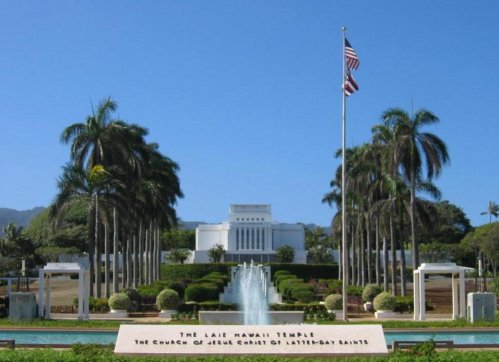The Eternal Family
Mormons believe that marriage is ordained of God. In Mormon culture, there are two types of marriage.
- Marriage for eternity. Mormons believe that, if performed by one who possesses the appropriate priesthood authority, a marriage can last forever, even beyond death. Indeed, marriage is considered essential for eternal progression in this life and in the next. Mormons call these kind of eternal marriages “sealings.” Children can also be sealed to parents, so that in addition to marital bonds other familial bonds can also be eternal. Because sealings are so sacred and so essential to spiritual progression, they are performed only in LDS temples and so are sometimes called “temple marriages.” ()

Families can be Together Forever - The Church has taken special care, especially in recent years, to offer support to those who for whatever reason are unable to enjoy the blessings of an eternal marriage. While the Mormon lifestyle is very family-centered, single adults and others who have not received the blessings of a temple marriage nevertheless make significant contributions to the Mormon community. God will bless them for their faithfulness. Elder Dallin H. Oaks explained in 1996 that persons who through no fault of their own are unable to enjoy eternal marriage in this life will not be penalized in the life to come if they remain faithful in keeping God’s commandments.
- Marriage for time. Marriage for time is limited by the traditional “until death do you part.” In the LDS community such marriages are typically performed in LDS chapels, usually by LDS bishops. The reasons for choosing to marry for time are many and include the following:
- Once the decision is made to marry, preparation for eternal marriage can take up to a year depending on the couple’s individual circumstances and prior Church experience/activity. Although the Church discourages it, some couples choose to marry for time before the preparation for eternal marriage is complete. In such cases, an additional year of preparation is required before a temple marriage can be performed.
- One spouse may not be interested in preparing for eternal marriage. This is often the case when Mormons marry those of other faiths.
- Those living in cohabitation (domestic-partnership) relationships who are interested in converting to Mormonism marry for time in order to qualify for baptism. After one year of growth and learning in the Church, such couples can subsequently be married for eternity.
The typical preparation for an eternal marriage includes regular Church attendance and obedience to God’s commandments.
- For a newly converted married couple, preparation for a temple marriage includes one year of full activity in the Church.
- For a married convert whose spouse chooses 1) not to become a member of the Church or 2) not to prepare for an eternal marriage, temple marriage is not possible. In such cases, however, Elder Oaks’ 1996 quote, cited above, certainly applies. Those who do all in their power to follow Christ but, by no fault of their own, are unable to enjoy a temple marriage in this life, will not be denied any blessings in the life to come. Many Mormons find themselves in this situation. These faithful members make important contributions and are valued members of the LDS community.

Vicarious Temple Work

- Mormons believe that between His death and resurrection, Christ visited those in the spirit world who had never had the chance to learn of His gospel or receive essential gospel ordinances. He preached to them and established a missionary program, sending those who had received the gospel to teach those who had not. Through these efforts, many of our ancestors have accepted Christ’s gospel. As these converts lack physical bodies, however, ordinances such as baptism are not possible.
- Members of the Church on earth research their family history. As they learn about their family’s past, they submit individual information about their ancestors to LDS temples.
- In temples, Mormons vicariously perform baptisms and other ordinances in behalf of their ancestors. Those in the spirit world are thus given the opportunity to accept or reject essential ordinances, in harmony with the concept of free agency.
The effects of vicarious temple work on the living are profoundly positive. Vicarious temple work expands the Mormon emphasis on the immediate family to include generations past. It helps Mormons better understand their roots and their place in God’s plan for humanity. Malachi 4:5-6 teaches, “Behold, I will send you Elijah the prophet before the coming of the great and dreadful day of the LORD: And he shall turn the heart of the fathers to the children, and the heart of the children to their fathers, lest I come and smite the earth with a curse.” Mormons believe this “turning of the hearts” is family history work and the subsequent work done in temples, work that unites families across generations.


Vicarious temple work expands the Mormon emphasis on the immediate family to include generations past. It helps Mormons better understand their roots and their place in God's plan for humanity.
4 Responses to “Mormon Families and Temples”